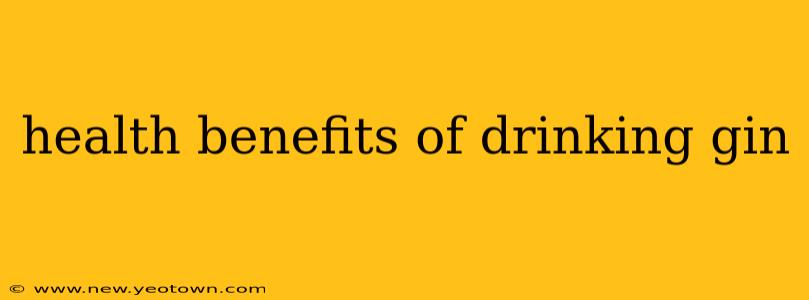The Surprising Health Benefits of Gin: A Spirited Exploration
Gin. The very word conjures images of sophisticated cocktails, dimly lit bars, and perhaps a touch of rebellious charm. But beyond its role in classic drinks like the Gin & Tonic and Martini, gin holds a surprising history and, some would argue, some unexpected health benefits. It’s important to preface this by saying that moderate consumption is key. Excessive alcohol intake is detrimental to health, regardless of the type of alcohol. This exploration focuses on the potential benefits found in moderate gin consumption, supported by existing research.
What are the main health benefits of drinking gin?
This question often leads to a flurry of speculation and myths. While gin itself isn't a miracle cure, several factors contribute to its potential health advantages, mostly tied to the botanicals used in its production. Juniper berries, the defining ingredient of gin, are packed with antioxidants. Antioxidants are vital for combating free radicals, unstable molecules that can damage cells and contribute to aging and disease. Other botanicals, depending on the gin, can also contribute various health-boosting properties. These can include anti-inflammatory effects and potential benefits for digestion. However, scientific evidence supporting these claims often lacks the scope of rigorous, large-scale studies.
Does gin have antioxidants?
Absolutely. The juniper berries, the heart and soul of gin, are rich in antioxidants. These antioxidants help protect your body's cells from damage caused by free radicals. Think of them as tiny superheroes fighting off the villains that contribute to aging and various health problems. The amount of antioxidants will vary based on the gin's specific botanical profile and production methods.
Is gin good for your liver?
This is where things get a little tricky. While some studies have suggested certain components of juniper berries might have liver-protective properties, it's crucial to remember that alcohol, in general, can damage the liver with excessive consumption. Therefore, any potential benefits from gin's botanicals are vastly outweighed by the negative impact of excessive alcohol intake on liver health. Moderate consumption is paramount.
What are the potential downsides of drinking gin?
Let's not sugarcoat it: excessive gin consumption, like any excessive alcohol consumption, carries significant health risks. These include liver disease, heart problems, increased risk of certain cancers, weight gain, and a host of other issues. It can also interfere with medications and worsen existing health conditions. Drinking gin responsibly is non-negotiable.
Can drinking gin help with weight loss?
There's no scientific evidence to support the idea that gin itself aids in weight loss. In fact, the calories in alcoholic beverages can contribute to weight gain if consumed excessively. A gin and tonic, for example, can easily pack in a substantial number of calories depending on the mixer and serving size.
Is gin better for you than other alcoholic beverages?
It's not accurate to declare gin inherently "better" than other alcoholic beverages. The overall health impact depends heavily on the amount consumed and the individual's health status. The presence of antioxidants in gin, particularly from juniper berries, might offer a slight advantage compared to some liquors lacking such components; however, this benefit is entirely negated by irresponsible consumption.
The Bottom Line:
Gin, in moderation, can offer some potential health benefits primarily due to the antioxidants found in juniper berries. However, it is crucial to emphasize that these potential advantages are completely overshadowed by the significant health risks associated with excessive alcohol consumption. The responsible enjoyment of gin, within the guidelines of moderate drinking, is the key to potentially reaping any small rewards while minimizing the considerable downsides. Always consult a healthcare professional if you have concerns about your alcohol consumption or any underlying health conditions.

